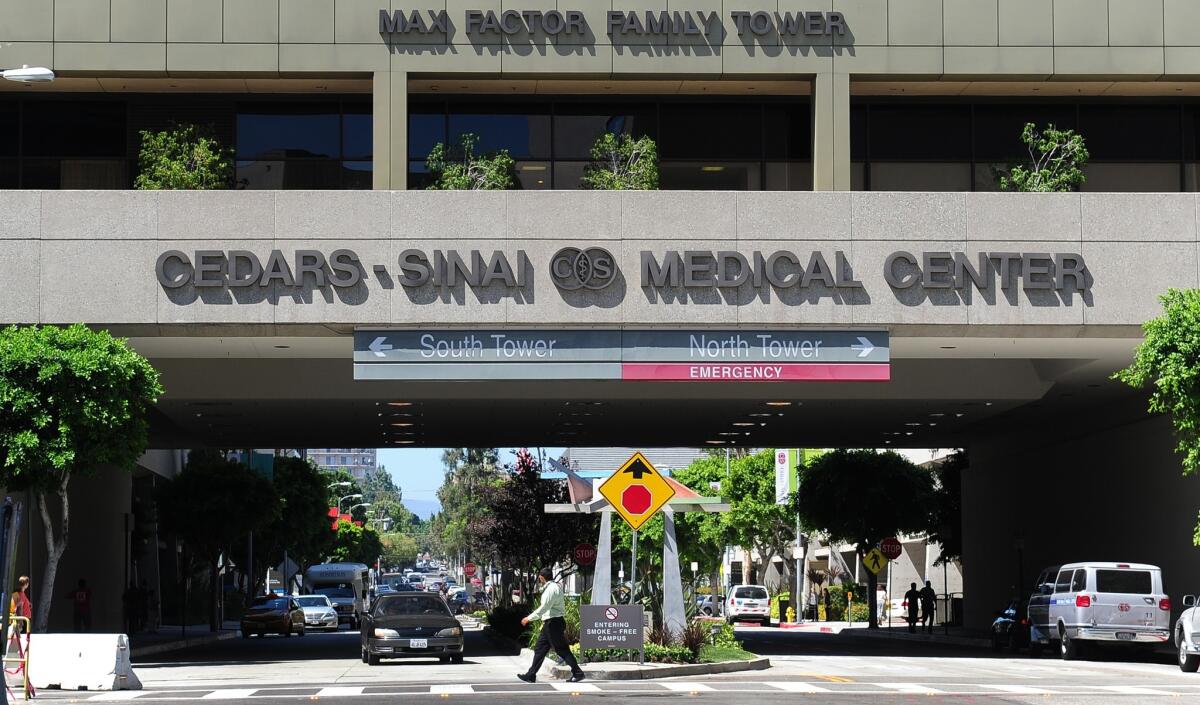FDA faults UCLA, Cedars-Sinai and Huntington hospitals for not disclosing safety problems with medical devices

- Share via
Federal regulators said 12 U.S. hospitals, including three in the Los Angeles area, failed to promptly report patient deaths or injuries linked to medical devices.
The Food and Drug Administration publicly disclosed the violations in inspection reports this week amid growing scrutiny of its ability to identify device-related dangers and protect patients from harm.
Some of the reporting lapses were found at the Ronald Reagan UCLA Medical Center and Cedars-Sinai Medical Center in Los Angeles, and Huntington Memorial Hospital in Pasadena. Other hospitals named included Massachusetts General Hospital in Boston and NewYork-Presbyterian Hospital.
Dr. Jeffrey Shuren, director of the FDA’s Center for Devices and Radiological Health, said the violations pointed to a larger problem among hospitals nationwide in reporting patient harm tied to medical devices.
“We believe that these hospitals are not unique in that there is limited to no reporting to FDA or to the manufacturers at some hospitals,” Shuren wrote in an agency blog post this week. “Hospital staff often were not aware of, nor trained to comply with, all of the FDA’s medical device reporting requirements.”
Under federal rules, hospitals must within 10 days report serious injuries potentially caused by devices to the manufacturer and notify both the manufacturer and the FDA about any deaths that may have resulted. Manufacturers are required to file reports to the FDA within 30 days of learning about an injury or death that may have been caused by a device.
It’s hard to discern what devices were involved or other details in many of these cases because the inspection reports are brief and partly redacted by the FDA. The inspection reports indicate that in some cases hospitals reported events late and in others not at all.
At Huntington, an FDA investigator found that a patient died from complications related to a multi-drug resistant infection and cardiac arrest following a procedure involving a duodenoscope, a long and flexible instrument put down a patient’s throat.
According to FDA records, Huntington learned through test results that the patient’s infection was likely related to 14 other confirmed infections caused by contaminated duodenoscopes. “However, this death was not reported to the FDA and the manufacturer by your facility,” the FDA inspector wrote in a December 2015 report.
A spokeswoman for Huntington Memorial, Eileen Neuwirth, said, “we have taken steps to ensure rigorous compliance going forward.”
Cedars-Sinai said the FDA’s findings related to its use of a surgical stapler in June 2015. The stapler malfunctioned and resulted in bleeding that required sutures, the hospital said.
Cedars-Sinai said it voluntarily reported the event to the FDA and the manufacturer. But the FDA determined it should have been handled as a mandatory report for serious injury, according to Cedars-Sinai.
Cedars-Sinai said it “looks forward to its continued partnership with the agency to ensure the highest standards for quality patient care.”
The FDA issued a nationwide alert about scope-related infections in February 2015 after The Times broke the news about a superbug outbreak at UCLA Medical Center.
UCLA said it promptly reported scope-related cases to the FDA but the agency asked for duplicate reports through a separate system.
“Hospitals are subject to a complex array of reporting requirements, and UCLA Health is committed to making timely and complete reports to federal, state and local regulatory agencies, as well as to device manufacturers,” UCLA said in a statement.
The latest findings underscore concerns raised by a U.S. Senate report in January, which exposed reporting failures by hospitals as well as mistakes by device makers that contributed to multiple superbug outbreaks across the U.S. from contaminated duodenoscopes. The FDA’s oversight of medical devices was also faulted in the report.
As many as 350 patients at 41 medical centers worldwide have been infected or exposed to contaminated duodenoscopes from 2010 to 2015, according to the FDA.
The agency initiated its investigation of hospitals’ reporting in December 2015, a month before the Senate report was released. But the agency was already under fire by then for spotty oversight of duodenoscope manufacturers and other devices.
Shuren said in his blog post that the agency focused on hospitals where safety issues had occurred involving either duodenoscopes or power morcellators, a surgical tool used in hysterectomies. Morcellators are used to cut up benign growths called fibroids, but the FDA has warned about the device spreading cancerous tissue in the abdomen and pelvis. The investigators examined incidents involving other devices as well.
Other than publicly announcing the violations, Shuren said the agency didn’t plan on taking further action against the hospitals. Instead, he said he wants to work with the hospital industry to improve monitoring of devices.
“We feel certain there is a better way to work with hospitals to get the real-world information we need, and we should work with the hospital community to find that right path,” Shuren wrote.
The issue may take on more urgency after federal authorities this month highlighted the infection risk from yet another commonly used device — heater-cooler units used in open-heart surgeries. The FDA is holding a public meeting Dec. 5 on improving hospital-based surveillance of devices.
Chad Terhune is a senior correspondent with California Healthline, a service of the California Health Care Foundation published by Kaiser Health News.
MORE
11 deaths at Huntington Hospital among patients infected by dirty scopes, city report says
Huntington Hospital accepts California’s end-of-life law
3 patients died in a Pasadena outbreak possibly caused by medical scopes
More to Read
Inside the business of entertainment
The Wide Shot brings you news, analysis and insights on everything from streaming wars to production — and what it all means for the future.
You may occasionally receive promotional content from the Los Angeles Times.











